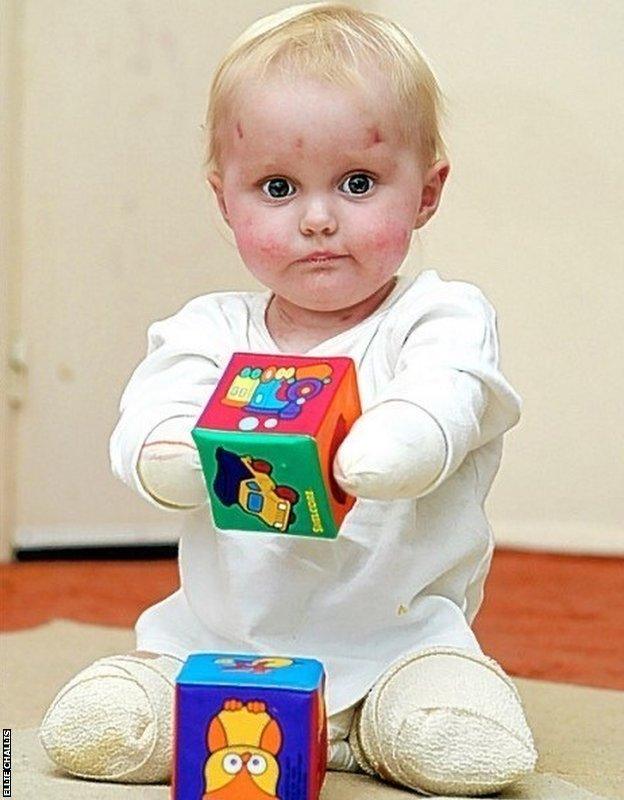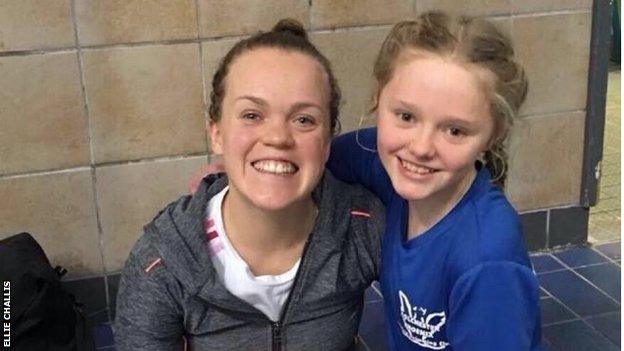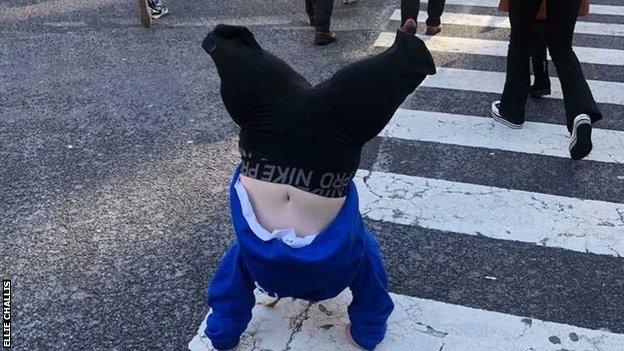Ellie Challis: Tokyo Paralympics hopeful wants 'to do things everyone says I can't'
- Published
'I want to do things that everyone says I can't'
For Ellie Challis, the swimming pool is her special place.
"Swimming gives me the most freedom and time to think. It's just you and the water," the Paralympic hopeful told BBC Sport.
"It is nice just to be able to get away from everything.
"I'm a teenager and I love my phone, but that's the one time of the day when I'm not around it."
In many ways, the 16-year-old is just like any other girl her age, but when she was just 16 months old, she developed meningitis.
The disease ravaged her tiny body and left her fighting for life, resulting in her having to have both legs amputated below the knee and both arms below the elbow.
But Challis, who has a twin sister Sophie, grew up in Essex with a passion for sport and a fierce determination which now means she is hoping to make a splash at the rearranged Tokyo Paralympics later this year.

Challis spent time in hospital after her amputations before continuing her recovery at home
And you underestimate her at your peril.
"I want to do things everyone says I can't, just to prove them wrong," she says.
"I've done lots of sports - I used to run on my prosthetic blades, I did trampolining in school, snowboarding, wheelchair football, netball and horse riding - although it's just swimming now.
"For me, sport was the way to be involved with people and it has definitely helped me make friends and be more social.
"Everyone assumes you can't do a lot until they actually meet you and see everything you can do. I pretty much do everything by myself. I don't need much help with anything.
"I've recently learned to tie up my own hair, which was one thing I thought I'd never be able to do, but I've managed that!"
Her dad Paul was the driving force to get Ellie into the water so she could be safe on family holidays, but even he could never have imagined what his daughter has gone on to achieve.
"When we were on holiday, people just assumed I couldn't swim," she explains. "Dad would literally throw me into the pool - knowing I could - but everyone else would just be really shocked.
"I was about 10 before I learned to swim properly, and it was when I saw someone else who had lost their limbs that led me to think 'Oh, I can do it'. It totally changed my mind."
In para-swimming, there are 10 different sport classes for athletes with physical impairment, numbered 1-10 - the lower the number, the more severe the limitations.
Challis, who swims in the S3 category is the only elite British female in her class and the only Briton, male or female, in the S1-S4 categories.

Challis has gone from meeting her hero Ellie Simmonds to becoming her GB team-mate
The first time she raced against other S3 swimmers was at the 2019 World Championships in London, where, cheered on by friends and family, she announced herself on the international scene with a brilliant bronze in the 50m backstroke.
The event also saw her become a team-mate of her swimming hero Ellie Simmonds, whose 2012 Paralympic golds were another huge source of inspiration.
After a disrupted 2020 with the pandemic and the postponement of the Paralympics, Challis says that the extra 12 months preparation have helped her.
She's based at the British Para-Swimming National Performance Centre in Manchester, she started her season with new British records in the 50m backstroke and 100m freestyle at the recent Manchester International Swim Meet, her first competition in almost a year.
She now needs to impress at next month's British Para Swimming International in Sheffield, which doubles as the Paralympic trials.
"Initially, I was looking at going to Tokyo with no pressure and just to have the experience of being at a Games, because it is so different from any other competition, and then look towards Paris in 2024 when I'll have learned more and I know what I want to do.
"But I've been able to get faster in lockdown, so it will be good to see where I am at trials. I think the Paralympics will be very different for everyone this time because nobody knows what anyone else is doing."
Challis' emergence onto the international scene has given particular pleasure to British Paralympian Fran Williamson, whose S3 domestic records she is now rewriting.
"My records have stood for a long time and for a while I thought they may never be broken," says Williamson, who was born with cerebral palsy and won silver and bronze medals at the 2004 Athens Olympics and 2008 Beijing Games.
"I think many people assumed that was exactly what I wanted. But that's not true.
"Ellie and I are very different athletes with different impairments, but it is great to see someone digging deep and finally taking my place in the GB line-up and be willing to put the hard work into achieving her goals."

Challis performs a handstand on the famous Shibuya Cross in Tokyo during a GB camp in 2020
As well as swimming, Challis is studying cake making in college where learning to write with chocolate and baking a special vanilla sponge cake for her family at Christmas have been among her proudest achievements.
"I use the same equipment as everyone else but I have a sticky mat to put my bowl on so it doesn't slip," she explains.
"College gives me something else from swimming. If I was doing something related to sport, then it would still be about swimming.
"I wanted to do something different and have different friends."
And she also wants be a trailblazer for what people with more severe impairments can achieve, both in and out of the pool.
"Hopefully more people like me can see me and think they can do sport as well - it doesn't have to be swimming.
"I want to get the lower classes in para-swimming out there a bit more because people don't know a lot about them and hopefully they will get more attention.
"It's harder for disabled people to get involved in sport, but when you get involved you really enjoy it."